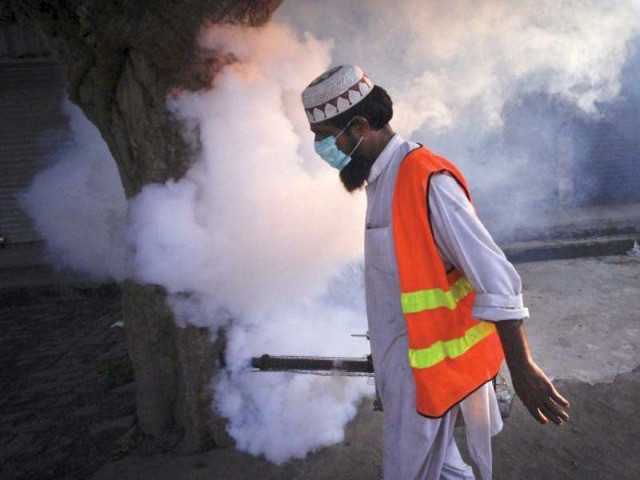Sindh / Karachi:
Karachi, as well as the rest of the Sindh, were plagued by dengue and the malaria season, which descends each year after the season after the monsoon, and yet minimum measures were taken to fight against this. In recent years, no spray has been made in Karachi. Only 18 employees are assigned to spray the city.
Medical experts regularly warn that it is essential to make a germicid spray after a rain spell. These experts also claim that during the monsoon, as well as mosquitoes, flies and other insects-allergens. Inaction further worsens the spread of diseases such as diarrhea.
During the monsoon season, the female mosquito eggs (Aedes Aegypti)Who causes the dengue virus to Karachi, begin to hatch in the larvae, and these mosquitoes reproduce quickly. These mosquitoes require human blood to survive, which they obtain by biting humans. For this reason, from September to December, the dengue virus is intensifying.
The relevant authorities of the district and health are aware of this situation, but in the past three years, especially when the headquarters of the disease transmitted by vector has moved from Karachi to Hyderabad, chemical routine germicidal spray campaigns, made to eliminate these mosquitoes, have become practically inactive.
Insufficient measures
For a population of at least 20 million, only 18 employees are responsible for spraying malaria and dengue in Karachi. These employees have not received their wages for eight months and have not been permanent for eight years.
More than 100 positions are vacant in the dengue program managed under the Department of Diseases at the Vector Operation.
The 18 dengue spray employees are displayed in the seven Karachi districts, with two to three spray employees are deployed by District in Karachi. However, these staff do not work under the district health offices (DHOS).
Spray employees, under the cover of anonymity, said that chemical spraying Germicid has not been carried out in Karachi for several years, but that politically influential officers have regularly sprayed in their homes.
The affected employees said that as part of this program, spray experts have been working on a contract for eight years and receive their wages once a year. These employees have ranks from the 2nd year to the 17th year.
These employees also declared that in Karachi and through the Sindh, after the monsoon rains, the reproduction of mosquitoes increases quickly from September and September to December, dengue and malaria become extremely aggressive, which leads to hundreds of precious lives lost each year.
Read: Vector transmission diseases continue to torment the city
Employees of the Vector-Borne Disease Department said that for the spray campaign to eliminate mosquitoes in Karachi, each district receives 1.2 million rupees per year, while the budget for germicidal chemicals is separated.
According to budgetary documents received by THE EXPRESSIONDuring the year 2024-2025, the budget for the dengue control program as part of the Department of Diseases causing vectors was increased from RS2.5 million to 67.349 million rupees, of which 16.66 million rupees were allocated for spraying.
During the current budgetary year, 14.5 million rupees were allocated specifically for chemicals used in mosquito spraying. Despite this, the spraying campaign in Karachi was not launched.
Dr Mushtaq Shah, director of the dengue control program of the disease of the disease, said: “We provide technical support to district health workers and local governments for the elimination of mosquitoes and the destruction of larvae emerging from female mosquito eggs”.
“The spray campaign is under the control of district health agents, and measures are taken to launch the campaign, and in many fields, spraying has already started.”
Dr. Shah said that in collaboration with Dhos, the spraying campaign to eliminate dengue has been launched.
Meanwhile, the Karachi district health agents claim that for fumigation, they do not have enough illness of disease transferable by the vector and that the personnel concerned is not administratively under the DHO.
Hospitals outdated
Public hospitals remain sub-prepare to treat the influx of patients with dengue and malaria that descend each year. People affected by the dengue virus suffer from high fever as well as a serious drop in the number of plates. However, there is no arrangement at the government level for the supply of platelets for people affected by dengue, so that most patients are forced to turn to private hospitals for treatment.
Trends in the case of dengue 2020-2025 in the Sindh
Currently, in private blood banks, a mega unit of platelets to save the life of a dengue patient is sold for 30,000 rupees at 40,000 rupees, while only one unit of platelets is sold for RS3,000 to RS5,000. A mega unit is administered to patients with a severe drop in the number of plates.
Meanwhile, managers of the provincial health department claim that public hospitals are gradually activating services and other facilities to prevent dengue.
People affected from 2020 to 2025:
According to data published by the Department of Vector Diseases, in 2020, a total of 4,318 individuals were affected by the dengue virus through Karachi and Sindh, and three people lost their lives to this virus. In 2021, 6,739 individuals were infected and the virus cost the lives of 28 people.
Despite this, no mosquito spraying campaign was launched through Karachi or Sindh, due to which the virus intensified in 2022. During this year, 22,274 people were affected and 64 people lost their lives. In 2023, 2,800 people were infected with dengue, but no death was reported.
In 2024, 892 cases of dengue were reported and a patient died. The deceased was a resident of the Karachi central district.
Until now in 2025, 557 cases have been reported and a patient has died. In the Sindh, a total of 162,091 was confirmed and three confirmed cases of cerebral malaria.




